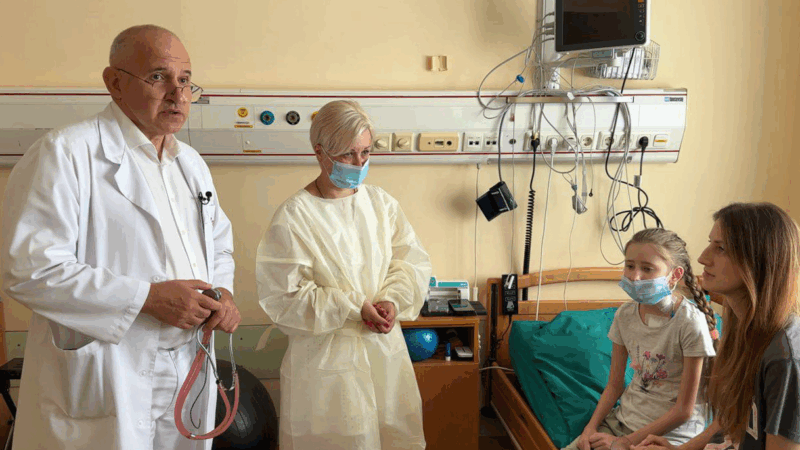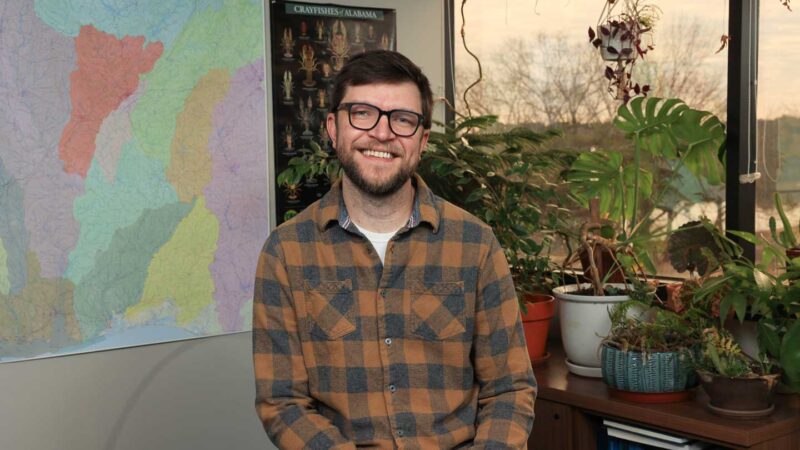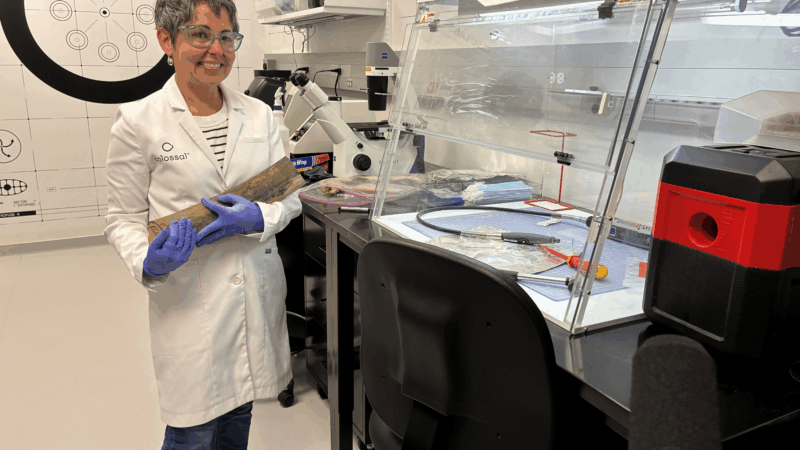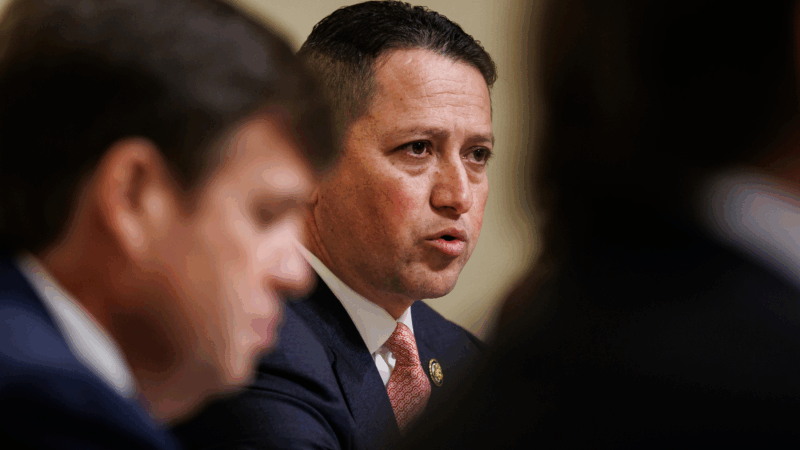Whatever happened to …. the 12-year-old Ukrainian girl in need of a heart transplant?
As a rule, the stories in our “following up” series look back at previous articles from Goats and Soda. But when freelance journalist Ruchi Kumar pitched the idea of following up on media coverage of a heart transplant for a 12-year-old girl, whose heart had been weakened by illness, we were interested. Doctors drove through one of the most brutal Russian attacks on Kyiv to collect a heart donated by the mother of a 4-year-old who had died of brain injuries from an accident. Here’s a look at that extraordinary night — and how the girl with the transplant is now faring.
On the night of July 9, Dr. Borys Todurov, the director of the Kyiv Heart Institute, received a call from a colleague at the Ohmatdyt Hospital across the city. Earlier that evenings, a 4-year-old girl had died of brain injuries from an accident, and her parents had agreed to donate her organs.
Todurov had a patient — Kira Skliarova, a 12-year-old girl from Luhansk region of Ukraine — who needed a new heart urgently. Childhood illnesses had severely weakened her own heart. “She was on the waiting list for a long time, and just one day before we implanted her with a mechanical heart, but she needed a transplant,” he told NPR.
He had to risk his own life to complete the surgery.
The donor’s body was located about 10 miles from the Heart Institute, which was on that evening under one of the heaviest Russian attacks since the start of the full-scale war in 2022.
“There were Russian missiles and drones everywhere, the air raid alert was going off,” he said. “But we had a chance to save a life so took it.”
A video made by Todurov shows their vehicle dodging explosions as Ukrainian air defenses fought off Russian drones. “On our way, we saw a lot of drones, and buildings that they targeted that were on fire,” he said.

Girl with a broken heart
Kira’s family was displaced during the Russian invasion of their region in 2014 and moved to Kyiv as internally displaced refugees. In 2019, the girl developed a severe case of pneumonia, which eventually led to inflammation of the heart.
She was diagnosed with post-myocarditis condition, her mother Alyona Skliarova, told NPR over a phone call. For the next six years, Kira endured a rigorous drug treatment regime and was frequently in and out of hospitals.
As her condition worsened, especially in the last six months, “her doctor told us, ‘It’s time to get her on a waiting list for a new heart,'” Skliarova said.
On July 8, her team of doctors decided the girl was facing imminent death and so operated to fit her with an artificial heart — an assistive device to help her body pump blood. “When I came to her [after the surgery], she was lying with that mechanism, with the whole thing on the outside, I could see the blood circulating. [It looked] like a suitcase, like the one we take with us when we go to the railway station,” her mother said.
“I was so shocked, really shocked. That image was not for the faint-hearted people to see,” she said. “I wondered, if there isn’t a donor heart available, how long could one live with this suitcase device.”
When the attacks of July 9 began, Kira was in the ICU after her surgery. Her mother was in the hospital but had to go to a shelter because of the intense bombing. Her husband — Kira’s dad — had died of COVID in 2021.
Surgery under fire
When news of the donor heart came, Todurov did not hesitate.
There was a limited window of time to extract the organ and then transplant it.
He and his crew — a scrub nurse, a surgeon and an anesthesiologist — drove to the Ohmatdyt Children’s Hospital amid the bombing and began the procedure, even as the ground beneath their feet shivered from the explosions.
“During the extraction, we could not only hear the noises of drones and missiles but also feel the vibrations of the explosion,” he said. “We knew it was very, very dangerous, but once we had the heart, it would only be viable for a few hours outside the body, so we decided to transport it right away,”
Back at their own hospital, Todurov’s team wasted no time to prep for the heart transplant — even as they felt the building shake from the explosions outside.
Despite the increasing intensity of attacks, they forged ahead. “Surgeries need to be conducted with precision; you need attention, focus, and we are doing this with explosions around us. We are working to save lives, and they are killing civilians around us,” Todurov said.
“A chance at a new life”
“It was a very serious attack that night, but the whole time, I was praying to all the gods, Kira, Kira, Kira,” her mother recalled. “Somehow we survived the night, and when the air raid alarms ended, I went to see Kira.” Her daughter no longer needed to be connected to the artificial heart contraption. “I felt a relief,” she said.
“Our doctors — they are gods on earth. I am so grateful to them!”
Kira still has a long road to recover but the doctors are optimistic. “Treatment and rehabilitation are ahead,” Todurov said, “but Kira now has a chance for a new, full life.”
The first three days after the transplant were sensitive, her mother said, as her body adjusted to the new heart. “She lost some weight at first. Her organs didn’t receive enough blood. and she was vomiting when she ate.”
After three days, Kira’s body embraced her new heart and her health began to improve.
“She has some issues with spasticity, where her muscle are stiffened, on the right side of her arm, leg and eye. But she is working with a rehabilitation therapist,” her mother said.
Bittersweet moment
Kira’s transplant has been a bittersweet moment for the mother of the donor — a 4-year old girl whose organs helped save two other lives that fateful night.
The mother of the donor visited Kira, said Aloyna Skliarova, “and listened to her daughter’s heart beat in Kira’s chest. On the one hand, that’s a tragedy for [her]. On the other hand, it became a chance for life.” She added with gratitude: “I respect her so much, and I’m so grateful for her decision. She gave my child a chance to live.”
Mother and daughter are determined to make the best of this new lease at life. “I hope we will have more walks in parks, catch up on everything. There are a lot of things in Kyiv that we haven’t yet seen, because we’ve spent these six years in hospitals or laying at home with the sickness,” Skliarova said.
One dream is to visit the Carpathian Mountains. “I was there once and I want Kira to see this beauty, go for a walk, climb on [the mount] Khomyak,” she said. “We are planning to live. Just to enjoy life, with this new heart. Only God knows what the future will be like, but yes, there is a will to live.”
Ruchi Kumar is a journalist who reports on conflict, politics, development and culture in India and Afghanistan. She is on X at @RuchiKumar
As Mississippi waits to spend opioid settlement funds, children and families suffer
Mississippi will receive more than $400M to fight the opioid epidemic. So far, officials haven't directed it toward programs that support addiction recovery.
Alabama’s new state climatologist takes the reins
The controversial John Christy is retiring as Alabama’s state climatologist. Lee Ellenburg now assumes the role and is already making a few changes, including declaring that climate change is real and caused by humans.
Colossal Biosciences breeds controversy while trying to revive mammoths
A Texas biotech company is trying to bring mammoths and other extinct creatures back to life. The science is as intriguing as the ethical questions are thorny.
Mundane, magic, maybe both — a new book explores ‘The Writer’s Room’
Why are we captivated by the spaces where where authors write? Katie da Cunha Lewin set out to explore "The Hidden Worlds That Shape the Books We Love."
GOP Rep. Tony Gonzales heads to a runoff in Texas amid a new ethics probe in the House
Texas Republican Rep. Tony Gonzales has faced increasing pressure from his party to resign or drop out of his race after allegations of an affair with a staffer.
Satellite images show Iran school strike hit more targets than earlier reported
The images suggest that precision munitions struck other buildings, including a clinic that was also inside the complex.






